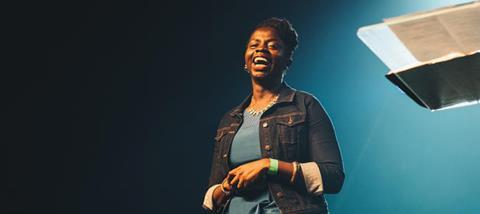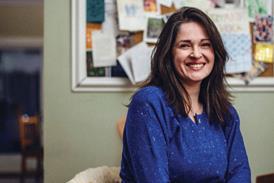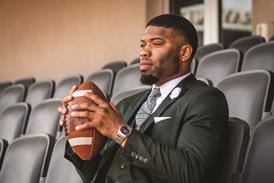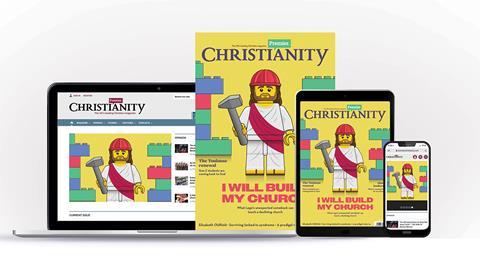
Just looking at the list of what Jo Saxton is involved in makes my head spin – and the impression she makes when we chat is that she lives life to the full. The bubbly extrovert has Nigerian roots but grew up in London.
Explaining how her family and wider community had “scant resources”, Jo recalls how many of her friends were children of drug dealers and addicts.
Her own family life was not straightforward, as she spent time in foster care and only met her father three times. However, she does not see herself as a victim: “When people have shared my story, the angle has often been the poor black child living on the wrong side of the tracks until rescued by a kindly white lady. I’ve been presented as a wounded victim who somehow struggles through and becomes a tough strong woman! I think it might make great TV and ticks the boxes of a few cultural stereotypes, but life was and is way more nuanced than that.”
Having become a Christian at a young age, Jo’s faith motivated her towards mission: “I didn’t expect life to be fair. But it still was unfair to see people in a place where they didn’t have a chance to flourish. My understanding of Christianity was we sought to heal broken hearts but also transform the world they were in.”
I was competing to not get left behind
Jo went on to plant missional congregations among students in Sheffield before moving to America in 2004 and eventually becoming an author and leadership coach. But when asked what most affected her sense of identity growing up, Jo references her aunt’s pep talk.
“The talk was: ‘Jo, to make it you’re going to have to be at least twice as good.’ It was very much a sense of: this is what it takes to survive in this world. This is what it takes to overcome the systemic and habitual stereotypes on account of your gender and your race.”
These words had a profound impact on Jo: “It wasn’t that I was competing to be better than anybody else – I was competing to not get left behind.
“The talk was reinforced on a regular basis in the world in which I lived. It made you think, ‘Wow, OK then. What does it take to get taken seriously for simply being who you are? To not be tolerated but celebrated?’ It certainly made me more driven.”
Much of Jo’s work since has been marked by a passion for leadership. She’s worked for churches both in the UK and the US, is chair of the board for 3DM, a charity that equips churches in discipleship and mission, and co-hosts a popular podcast (Lead Stories: Tales of Leadership in Life).
She says it was the encouragement of others that has enabled her to be in the positions she holds today. You could say she’s dedicated the rest of her life to giving something back by raising up other leaders. Mentoring women is one of her greatest passions. She sees it as “an absolute gamechanger”, regularly gathering groups of women to affirm them, equip them and “build their confidence so they can be unleashed”.
She knows there are many talented women who simply need encouragement, as she did: “I get tired of people asking, ‘Where are the women who are speaking?’ I get asked this in both the US and the UK and there is no reason for either, just look harder! It’s actually not that hard, it really isn’t. But equally, sometimes women leaders find it harder to articulate what they want – particularly as ambition is not always seen as feminine. They can worry: ‘Will people say I’m too arrogant? Will people say I’m too much?’ We forget that we’re not doing this to raise ourselves. I mean, if I wanted an easier life, I’d go and eat pancakes somewhere. But this is about the kingdom of God.”
Jo is gregarious, confident and direct, but also laid-back, humorous and engaging. Her infectious laugh and willingness to share from her own experiences – mistakes as well as successes – mean that she is highly sought after as a speaker. Her books reveal her personality and wisdom too. Mainly focused on topics surrounding gender and leadership, her latest work, The Dream of You (WaterBrook) is her most personal.
You divulge a lot of detail about your own life in this book; why did you think now is the time to do that?
It’s funny, I didn’t actually realise quite how much I said about myself until later. I was a bit slow on that, so I thought, “Oh dear, it’s there.” I think it was the nature of the topic, because it’s a lot to do with framing, how we frame our identity and how our identity gets us to where we are. I asked the question, “Who were you before anybody told you who you were supposed to be?” And it always gives people pause, because we know there are so many internal and external factors that have shaped us. It felt weird to write about that without talking about my own life. As a leader when you’re wanting people to go to tender places you’ve got to be willing to model that in some way and be transparent and vulnerable.
You talk about being fostered as a young child – along with your brother – with a white family. What sort of effect did that have on your identity?
My foster mother was very normal. I’m so grateful to the Lord for her. She never asked me to assimilate; she always celebrated our culture. And so I didn’t have to fit in; she learned how to do my hair. She learned what my skin needed; she learned all those things and never made it weird, which was great.
I think it was probably weird to some of the neighbourhood. Because it was the 70s and racism was more explicit; it’s not that it has gone away – in fact it seems to be making a comeback – but at that point it was really explicit. It was very clear we belonged in terms of family and community, but everybody knew something was different about us. And so that was always pointed out. Sometimes out of curiosity, sometimes aggressively, sometimes negatively.
I returned to live with my mum about two months before my sixth birthday. The “Why?” was never discussed; it just happened. It sounds odd to say “it was time”, but I guess it was.
I learned not to trust people quickly or easily, although I’d be lying if I said that foster care was the only reason from my childhood for that.
There were a few significant sources that all played a big part, such as a bullying era at school (when a couple of girls voiced the things in public that I privately feared were true), the racism I’ve encountered throughout my life, and later the wilderness years.
You had difficulties seeing God as your Father, due to the absence of your earthly dad. What changed?
God came to me…I didn’t get there; I was clueless. It was 1990 at St Mark’s Church in Kennington, and someone had given a prophetic word-based plea about somebody not knowing who the Father was and it just undid me. Because God saw fit in among a few hundred people to highlight my life.
It wasn’t even that I felt special; I felt known and seen. I felt for a lot of life – either through my own personal circumstances or the circumstances of the culture – I was not being seen for who I was and therefore not being valued – and it was this moment where the King of kings said, “I see you.” He said, “I see your story. I see your pain. I see your history. I see your grief. And I see how you’ve got on with it and it matters to me. It matters to me that you’ve been through this.” It just undid so much junk, and even after that there has been an ongoing process of getting to know God as my Father. He’s been very persistent in helping me understand.
It can be painful when God does a deep work, and so we can avoid that. How did you learn to push through rather than hiding?
I think pain is a great teacher one way or another – whether it’s the healing pain of being vulnerable or the damage.
I don’t want to buy into the lie that vulnerability is the sign of you being weirdly damaged. Of course I’m damaged; I’ve lived life, like we all have. I don’t want to pretend that me just covering up all my junk is the way to cope when actually he gives us pathways to life. And sometimes those pathways have taken me to an altar, which has also had a doctor’s office involved – and I don’t need to be ashamed of that! I just want to be free. When you are free you care less. I like freedom. Freedom tastes way better than the other stuff.
What about vulnerability with one another? Why do we choose protection instead?
Who wants to go first to say: “Hey, I’m working through an eating disorder” or, “Hey, I cut myself today” or, “Hey, I lost my job and it’s my fault”? All our reasons are very human and very understandable. Sometimes, we have been vulnerable and it’s been taken for granted, or it’s been taken advantage of or abused. And so we protect ourselves because we got hurt. And it’s hard that the same instruments of hurt can also be the instruments of our healing; other human beings. It’s just really risky territory, to dare to go there.
Our God in his very nature is relational. And Jesus, who modelled the perfect life, was relational and vulnerable with the people around him, when he wept before them and asked them to stay with him for a while in Gethsemane. So he models for us a way to live, but it is costly. It really is.
You compare moving to America to entering the wilderness – feeling stripped of all you had known, including the bigger role you had in church, and the people you had left behind. You also talk about time in the valley – when you lost two close family members. What did you learn in those places?
The wilderness was hard. And it was long. I think it was wonderfully humbling in many ways. I learned a lot about the Lord. I learned that he was there and he was faithful and he was kind. The wilderness stripped things away but actually made it quite simple again. I learned that whether times are good or bad, I know how to dig for a well…I know how to dig for water in tough times.
I realised afresh the importance of praying. It hit home how key it is to deal with the stuff in your life.
In terms of the grief time, it was just devastating – losing my foster mother and my father in such a short space of time, five weeks apart. Looking back, I realised how much the Lord carried me. He just held me.
The wilderness and the valley aren’t all terrible. Arizona is this arid, dry place where if you don’t drink water fast it does mess you up, but it’s also this beautiful place of big, bright blue skies and amazing sunsets. Valleys are desperate places but they’re really intimate with God as well.
God never left, he’s never going to leave and he’s never going to forsake me. And it was never about a job or a role or all those sorts of things, it wasn’t even about a country; it was about how faithful and good he was, and still is.
To hear the full interview listen to Premier Christian Radio at 4pm on Saturday 12 May or download The Profile podcast premierchristianradio.com/theprofile
Jo Saxton will be speaking at New Wine this summer. For more information visit united.new-wine.org
Click here for a free sample copy of Premier Christianity magazine




























